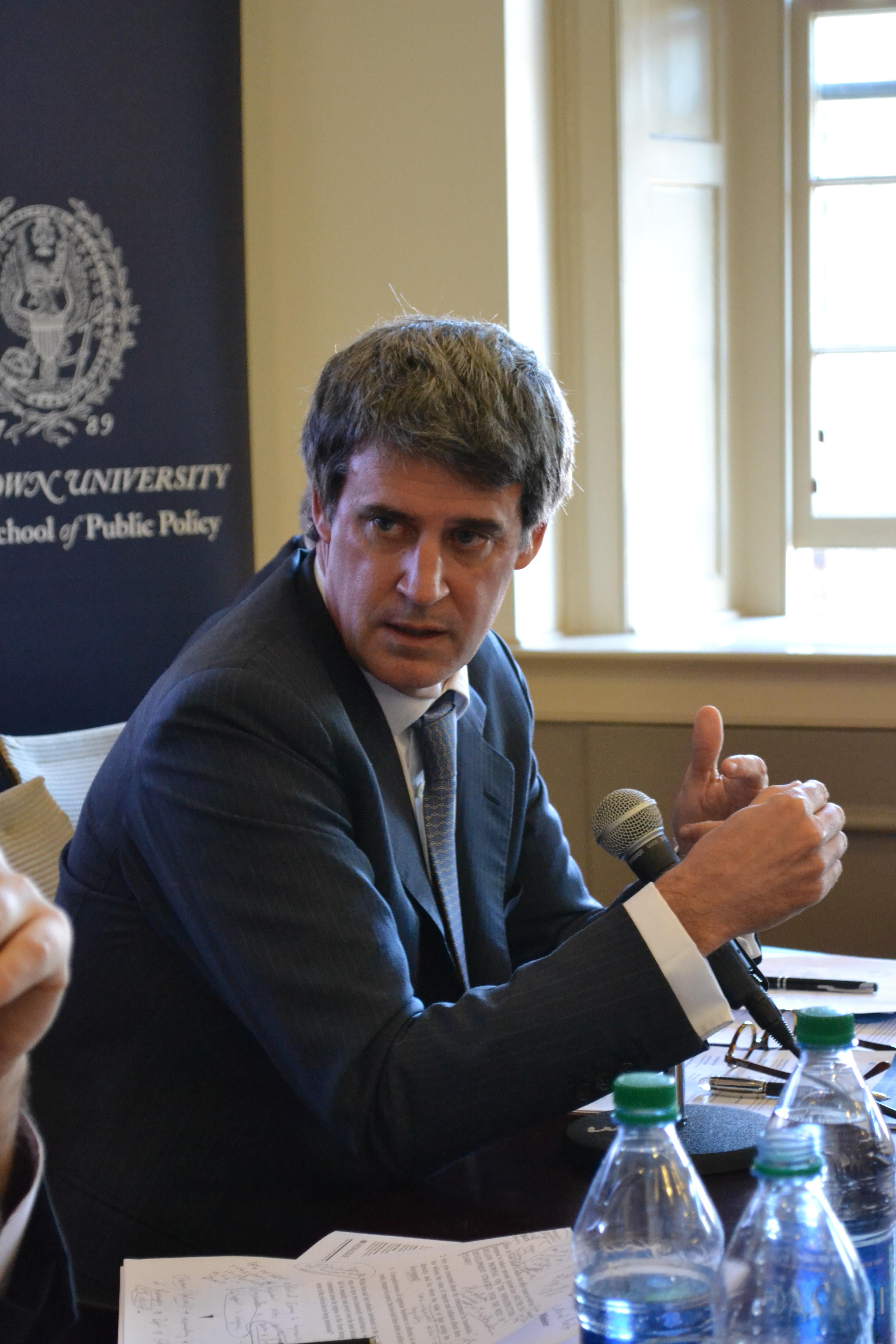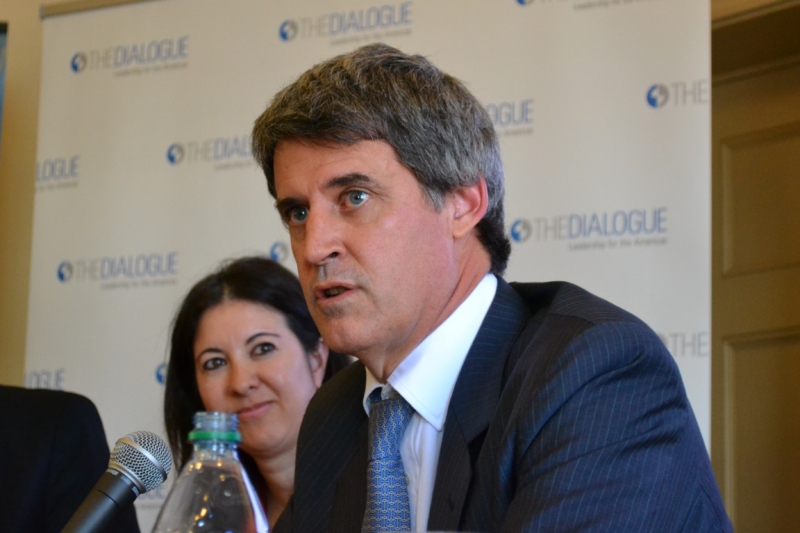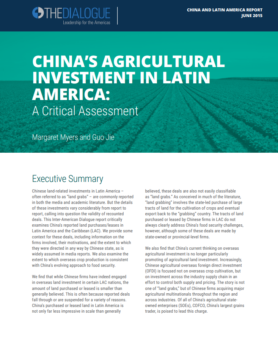The Nationalism of Cristina Fernández de Kirchner
Argentine President Cristina Fernández has increased her appeals to nationalist sentiment to build domestic political support.
The change in government in Argentina has led to many rapid transitions. The Macri administration has lifted capital controls, improved diplomatic relations with the United States, and a US court ruling this week cleared the way for the country to return to global bond markets. In order to discuss these changes and the challenges that lay ahead, the Inter-American Dialogue, in partnership with the McCourt School of Public Policy at Georgetown University, invited Alfonso Prat Gay, Minister of Finance in Argentina, to give a public lecture.
The event began with introductory remarks by Adriana Kugler, Vice Provost for Faculty at Georgetown University. The President of the Dialogue, Michael Shifter, then introduced Minister Prat Gay, thanking him for his contributions to the Dialogue—where he has been a member for six years. Before turning it over to the Minister, Shifter reminded the audience that many challenges still exist for the Macri administration, such as an opposition-controlled Congress and several outstanding fiscal issues.
Resolution of holdout issue is "a huge step" for Argentina #PratGayDC pic.twitter.com/iuDbu1q3WM
— The Dialogue (@The_Dialogue) April 14, 2016
Minister Prat Gay’s initial remarks described President Macri’s clear decision to make Argentina “part of the world” again. “We have been out of it for too long, unnecessarily so,” he remarked. He expressed satisfaction with the decision taken by the US Appeals Court the day prior. Prat Gay mentioned how, while most people did expect the government to be able to close out a deal, a survey in Wall Street expected them to do so by the end of the year, making this decision clearly ahead of schedule. “It was the message we have of change being possible that pushed us through,” he added.
For Prat Gay, the most important day of the administration so far was not the day they won the elections, or the day they took office. It was March 31st, when the law that allowed Argentina to pay off its debts was approved by the Senate with more than 70% of the vote. He indicated that most votes came from the opposition, from people who said they would never pay the vultures. “This is a sea change,” Prat Gay asserted, claiming that this remarkable political consensus represents the government’s greatest achievement to date.
He further noted that there have been other milestones along the way, such as the visits from leaders of countries that had not been to Argentina in 20 years. Moreover, the government is revamping the National Statistics Institute, which “the previous government used to lie obscenely,” Prat Gay noted. He further added that it would take a while to rebuild its capacity, “Argentina is no longer lying about its statistics.”
[caption id="attachment_49041" align="alignright" width="281"] Photo by Ben Raderstorf / Inter-American Dialogue[/caption]
Photo by Ben Raderstorf / Inter-American Dialogue[/caption]Noting how many pundits and experts have expected the Macri administration to undergo a series of radical changes in record time, Prat Gay argued that it is “one thing to write a report, and another one to run a country.” He added that it is not possible to bring down inflation from 30% to 5% in one year, for example, and that they inherited a country with a stagnated economy and a 30% poverty rate. Prat Gay asserted that “the best way of rebuilding credibility is by promising what can be achieved and achieving what can be promised.” He did note that the government is expecting growth of around 4% next year and inflation below 17%.
When asked how the government was planning on reducing a deficit that is estimated at more than 6% of GDP, Prat Gay mentioned how three quarters of the deficit come from subsidies in farm and energy sectors. He argued that by adjusting subsidies and reducing corruption, they planned to shrink the deficit while kickstarting growth, adding that this will be perhaps the most difficult year “because we have no growth or clear benefits of the measures we’re taking.”
The panel then shifted to Hector Schamis, Adjunct Professor at Georgetown, who called the current government “one of constitutional principles, separation of powers, and individual rights and freedoms.” He noted that, more than restoring strong relations with countries like Italy and France, Argentina should also do so with its neighbors, such as Uruguay. He further added that not only is the Statistics Institute broken, so is the central bank, and the civil service. “The government will have to pick and choose” which of these to prioritize, Schamis argued.
Prat Gay was then asked about political blowback to the reduction in subsidies and hike in transport fees. He mentioned how the government has committed itself to no further hikes in prices as they are focused on making sure that the poor are not left out and not exposed to utility prices they won’t be able to afford. Although, Prat Gay admitted, “we are learning by doing.”
"Public policy is back" in Argentina says @MichaelShifter in closing #PratGayDC pic.twitter.com/hwE8gEtghE
— The Dialogue (@The_Dialogue) April 14, 2016
Asked about the ongoing investigation into exchange practices by Cristina Fernández de Kirchner, Prat Gay asserted that the government’s position is to “let the judiciary do their work.” He added that the judiciary now has the freedom and independence to carry out their job unburdened by political influence, and the government is pleased with that fact.
The event concluded with remarks by Michael Shifter, who lauded the Argentinian government’s recent measures. “We are seeing the return of public policy and of a pragmatic approach to what works and what does not,” said Shifter. This, for Argentina, is a welcome development.
Argentine President Cristina Fernández has increased her appeals to nationalist sentiment to build domestic political support.
China is looking for new agricultural investment opportunities in Latin America, but not necessarily for large tracts of land.
Given their close proximity to the United States, LAC countries are well-positioned to capitalize on the surplus of US gas exports and current buyer’s market.
 Ben Raderstorf / Inter-American Dialogue
Ben Raderstorf / Inter-American Dialogue

